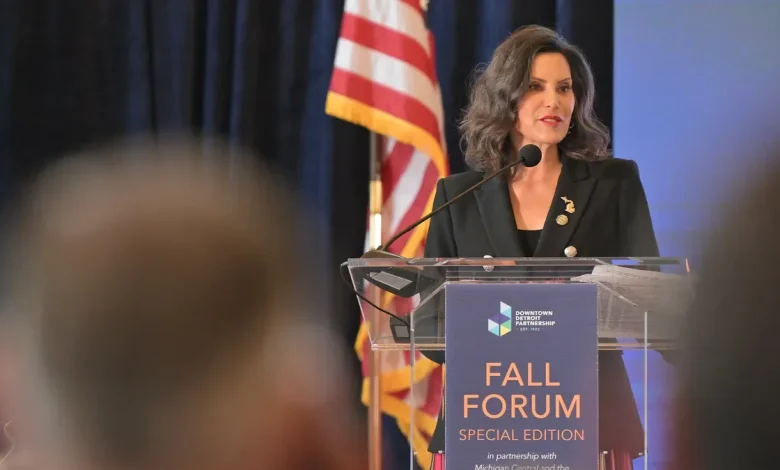Whitmer-tied nonprofit draws $7.7M from secret donors in 2024, staffs up

Lansing — A nonprofit organization that’s been supporting Michigan Gov. Gretchen Whitmer hauled in $7.78 million from secret donors in 2024, while hiring the Democratic executive’s former campaign staff as employees, according to a newly filed tax document.
The group, Road to Michigan’s Future, which has existed since January 2020, doesn’t have to report the identities of its contributors, even though many of its sponsors — whose names have become public in the past through other means — have had interests in matters before the state government.
The 2024 tax filing revealed the organization’s second-largest annual fundraising amount — despite Whitmer not being able to run for governor again — and marked the first time Road to Michigan’s Future disclosed having employees who made at least $100,000 each. The group said it had 18 employees in 2024. The five who were paid the most were all former employees of Whitmer’s campaign for governor, including Heather Ricketts, her campaign’s compliance director, and Amanda Stitt, her campaign’s chief strategist, according to the Internal Revenue Service filing obtained by The Detroit News.
Whitmer, who was reelected in 2022, can’t run again for governor in 2026 due to term limits. As a result, state law places limits on how she can use her traditional state campaign fundraising committee.
However, there aren’t similar limits on the nonprofit, and Michigan law allows elected officials to work closely with nonprofits while not having to report anything about benefits, such as meals or travel expenses, they or their allies receive through them.
Road to Michigan’s Future appeared to be a vehicle for Whitmer to stay involved in the upcoming elections, said Adrian Hemond, a Michigan political consultant and CEO of the firm Grassroots Midwest. The nonprofit’s high level of activity was a sign of her desire to remain politically relevant, whether that helps her run for president later, seek a cabinet position in a future White House administration or something else, he said.
“This is keeping her options open,” Hemond said in response to a description of the organization’s 2024 tax filing.
The organization’s annual filing — a document that provides only broad details about its fundraising and spending for the previous year — is usually due in mid-November.
Mark Fisk, a prominent Democratic political consultant in Lansing and spokesman for Road to Michigan’s Future, released the tax record at the request of The Detroit News on Monday.
Fisk issued a statement Tuesday after The News asked what voters should make of an organization that accepted nearly $8 million last year from secret donors.
“At Road to Michigan’s Future, we take seriously our mission of supporting Gov. Whitmer’s agenda of lowering costs and promoting affordability for Michigan families, creating good-paying jobs and opportunities for young people and improving the quality of life for everyday Michiganders,” Fisk said in a statement. “We follow all IRS rules and requirements to the letter of the law and will continue to do so.”
Of the $7.7 million raised in 2024, $3.1 million came from just six donors, who contributed at least $500,000 each. The tax filing features the amount individual contributors gave, but not their names. The two biggest contributions were $550,000 each.
The group reported spending $4.75 million in 2024 and reported having $5 million still left over to begin 2025, Whitmer’s second-to-last year as governor.
Of the $4.75 million in spending in 2024, $1.1 million went to salaries and wages. Ricketts was paid $269,950 in total compensation from the nonprofit, while Stitt made $240,000, according to the tax filing.
Brieann Sauer, who was the finance director for Whitmer’s campaign, was also listed as the finance director for Road to Michigan’s Future, making $154,000 in total compensation. And Emily Eccleton, who was deputy finance director for Whitmer’s campaign, was listed as director of fundraising partnerships for the nonprofit and was paid $126,000 in 2024.
In its past filings, for 2020, 2021, 2022 and 2023, Road to Michigan’s Future didn’t list having an employee who made more than $100,000 in a year. It reported having four employees in 2022 and zero employees in 2023, 2021 and 2020.
Road to Michigan’s Future also reported spending $588,000 in 2024 on food, travel, conferences, conventions and meetings. The nonprofit didn’t have to report the specifics of the expenditures. Of that amount, $86,748 went to travel.
The group’s biggest fundraising year was in 2022 — Whitmer’s reelection year — when it raised $12.9 million. Across the five years, the nonprofit has reported raising a combined $38 million.
‘Not saying anything’
The focus of Road to Michigan’s Future has appeared to be promoting and supporting Michigan’s Democratic governor and like-minded causes she’s endorsed.
It launched in 2020 by touting Whitmer’s plan to borrow $3.5 billion in new state debt for highway reconstruction projects.
In the 2024 tax filing, the organization told the Internal Revenue Service its mission was to “conduct educational research and analysis to inform the public on public policies and issues of concern” and “to provide an understanding of how current policy initiatives will affect the well-being of Michigan.”
Richard Wiener, a longtime Lansing lobbyist who served as the chief of staff to Democratic former Gov. Jennifer Granholm, is the president of the nonprofit’s board. Wiener referred questions about the multimillion-dollar organization he leads to Fisk.
“I’m not saying anything,” Wiener said during a brief Tuesday phone conversation.
The board’s other two members are former Lt. Gov. John Cherry and former state Senate Minority Leader Robert Emerson. They didn’t respond to calls seeking comment.
A source with knowledge of the nonprofit’s operations, who spoke on the condition of anonymity for lacking the authorization to speak publicly, said Whitmer’s team has used the organization as a “catch-all” fund for her political activities.
For 2024, Road to Michigan’s Future reported giving about $1.3 million to other organizations, including $639,500 to the 21st Century Fund, a fundraising account of the Michigan Democratic Party.
The nonprofit also gave $60,000 to Planned Parenthood Advocates of Michigan and $450,000 to a Washington, D.C., group called the Story Network Foundation. The contribution to the Story Network Foundation in 2024 was meant to combat “misinformation on gun control issues,” according to the tax filing.
The Story Network Foundation reported raising only $175,500 in 2023 and said its mission is to “combat misinformation and promote truth across social networks,” according to a filing with the IRS.
The Story Network Foundation’s 2024 advertising on Facebook included a video ad opposing President Donald Trump’s tariff increase policies set to a parody of Billy Idol’s “Rebel Yell.”
“When the tariffs come, you’ll pay more, more, more,” the singer in the ad says.
Likewise, Road to Michigan’s Future gave $45,000 to the Detroit Association of Black Organizations, a group led by the Rev. Horace Sheffield III, a pastor, a community organizer and the father of Detroit’s mayor-elect, Mary Sheffield. The money was “a nonpartisan voter education grant,” according to the tax filing.
Road to Michigan’s Future sent $25,000 to The Nile Group, a company that does canvassing and door-knocking efforts in Detroit.
Carol Banks, The Nile Group’s authorized agent, said the Michigan Democratic Party had contacted her about the $25,000 and sought the firm to do canvassing on behalf of Democrats in the state’s largest city.
“We were surprised,” Banks said of her reaction to the party’s outreach.
Mystery donors
In recent years, a series of scandals have emerged in Michigan involving nonprofit organizations and top state lawmakers, including former House Speaker Lee Chatfield, a Republican from Levering, who’s been accused of moving money from a nonprofit called the Peninsula Fund to make direct payments on his personal credit card.
Chatfield’s trial is scheduled for next year. He has pleaded not guilty.
While other states limit officeholders’ ability to coordinate and work closely with nonprofits that can accept secret contributions, the arrangements remain legal in Michigan, said Hemond, whose consulting firm is based in Lansing.
Attorney General Dana Nessel, a Democrat whose office is prosecuting Chatfield, has been openly critical of elected officials in Lansing using nonprofit organizations to accept anonymous donations while contributions to their campaign committees must be publicly disclosed.
Nessel said Tuesday she’s supportive of legislative efforts to shine more light on the process.
“I think that everybody in this state deserves to know why decisions are being made the way that they’re being made by our elected officials,” Nessel told reporters. “Obviously, if we have these dark money PACs and anonymous donors, then, you know, people don’t know who was influencing their decision.”
There’s little oversight and disclosure of how the nonprofits spend their cash and no standards to prevent conflicts of interest among donors and lawmakers who vote on bills that benefit the donors financially.
The public only finds out who’s behind the money given to organizations, such as Road to Michigan’s Future, when the donors themselves report their contributions.
For instance, in 2022, Michigan Energy First, a nonprofit tied to DTE Energy, disclosed giving $750,000 to Road to Michigan’s Future that year. Whitmer appoints the members of the Michigan Public Service Commission, which regulates investor-owned utilities such as DTE and Consumers Energy.
Citizens for Energizing Michigan’s Economy, a nonprofit tied to Consumers, reported giving $200,000 to Road to Michigan’s Future in 2022.
For 2024, campaign finance disclosures showed that a committee of the Michigan Realtors, which lobbies on behalf of those in the real estate business, gave $100,000 to the pro-Whitmer group. Tenet Health, the for-profit owner of the Detroit Medical Center hospitals, voluntarily disclosed contributing $50,000 to Road to Michigan’s Future in 2024.
Rep. Dylan Wegela, D-Garden City, has repeatedly voiced his opposition to officeholders using nonprofits to raise money in secret from groups and companies interested in their policy decisions.
“This is what oligarchy looks like,” Wegela said. “The rich donating hundreds of thousands in secret.”
The Wayne County lawmaker called on Whitmer to make all of the donors’ names public.
“The people deserve to know who is funding not just the governor, but all of us in state government,” Wegela said.
Across the aisle, Rep. Steve Carra, R-Three Rivers, said Michigan’s political system allows massive donors to give money while expecting favors in return.
“I think she should return it and apologize for ever taking it,” Carra said.
A committee called Michiganders for Money out of Politics is currently gathering signatures for a ballot proposal to ban the state’s dominant electric utilities and major contractors from giving money to political leaders and to shine new light on the flow of secret money in Michigan elections.
cmauger@detroitnews.com
Staff Writer Beth LeBlanc contributed.





